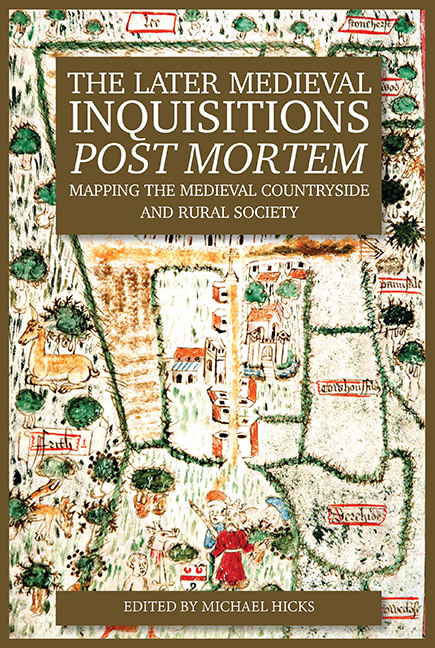Book contents
- Frontmatter
- Contents
- List of Illustrations
- List of Contributors
- Glossary
- List of Abbreviations
- 1 Introduction
- 2 Records of an Imperial Administration? Inquisitions Post Mortem in Scotland and Calais
- 3 Inquisitions Post Mortem in Medieval Ireland
- 4 The Court of the Honour of Clare, 1308–60: Feudal Incidents and Inquisitions
- 5 Landscape, Farming and Society in an English Region: The Inquisitions Post Mortem for the West Midlands, 1250–1509
- 6 Beyond the Dots: Mapping Meaning in the Later Medieval Landscape
- 7 Fairs and Markets in the Inquisitions Post Mortem
- 8 The Structure of the Milling Industry 1427–37
- 9 Proofs of Age 1246 to 1430: Their Nature, Veracity and Use as Sources
- 10 What Went On in the Medieval Parish Church, 1377–1447, with Particular Reference to Churching
- 11 Retainers, Monks and Wine: Three Insights into Everyday Life
- 12 The Administration and Efficiency of the Inquisitions Post Mortem Process: A Case Study of Northumberland
- 13 Late Medieval Land Disputes and the Manipulation of the Inquisitions Post Mortem
- Index
11 - Retainers, Monks and Wine: Three Insights into Everyday Life
Published online by Cambridge University Press: 26 May 2021
- Frontmatter
- Contents
- List of Illustrations
- List of Contributors
- Glossary
- List of Abbreviations
- 1 Introduction
- 2 Records of an Imperial Administration? Inquisitions Post Mortem in Scotland and Calais
- 3 Inquisitions Post Mortem in Medieval Ireland
- 4 The Court of the Honour of Clare, 1308–60: Feudal Incidents and Inquisitions
- 5 Landscape, Farming and Society in an English Region: The Inquisitions Post Mortem for the West Midlands, 1250–1509
- 6 Beyond the Dots: Mapping Meaning in the Later Medieval Landscape
- 7 Fairs and Markets in the Inquisitions Post Mortem
- 8 The Structure of the Milling Industry 1427–37
- 9 Proofs of Age 1246 to 1430: Their Nature, Veracity and Use as Sources
- 10 What Went On in the Medieval Parish Church, 1377–1447, with Particular Reference to Churching
- 11 Retainers, Monks and Wine: Three Insights into Everyday Life
- 12 The Administration and Efficiency of the Inquisitions Post Mortem Process: A Case Study of Northumberland
- 13 Late Medieval Land Disputes and the Manipulation of the Inquisitions Post Mortem
- Index
Summary
Witnesses to proofs of age testified unconsciously to their assumptions, habits, and expectations across a whole range of topics. Such data illuminates aspects of everyday life and fills gaps in the formal record. This chapter demonstrates the utility of this material with reference to three contrasting themes: bastard feudalism, monasticism, and the wine trade. It is based on the published calendars xv– xxvi (1377–1447); since, however, proofs of age are a retrospective source that looks back 14, 16, or 21 years from the date of the inquiry, some data stretches even further back in time.
I
Historical knowledge of bastard feudalism, like most fifteenth-century topics, is imperfect. The classic sources popularised by K.B. McFarlane and N.B. Lewis are the indentures of retainer in peace and war sealed to mutual advantage between a lord and a retainer on a specific occasion and creating a contract for life. This is the spirit usually inferred for less formal records, such as baronial letters patent that conferred annuities or appointments, their enrolments, or the mere listing of annuities in ministers’ and receivers’ accounts. What service the retainers performed is not generally specified in such sources, indentures of war being limited to one campaign. At another extreme of aristocratic entourages there was the household, for which the key functions – cook, butler, the chamber, and stable – are inferred, for every lord needed to eat, drink, dress, and travel. The personnel are seldom identified. Servants in action do crop up accompanying their lords, delivering messages, fighting, drawing up rentals, and delivering monies, but generally their functions have to be deduced. Similarly the reasons for such retaining tend to be explained in political terms, often correctly, like the 2,000 Stafford knots (badges or armbands) that Humphrey Duke of Buckingham had prepared at parliament time in London in 1454, or the appointment by George Duke of Clarence of Sir Robert Welles ‘great captain of Lincolnshire’ as steward of his lordship of Calceby (Lincs.) during the Lincolnshire Rebellion in 1470. It is usually mere speculation that the lord wanted his men to riot, to overawe his enemies or determine elections, to make an impressive escort for him at parliament, to serve him at table, or to decorate the household.
- Type
- Chapter
- Information
- The Later Medieval Inquisitions Post MortemMapping the Medieval Countryside and Rural Society, pp. 174 - 192Publisher: Boydell & BrewerPrint publication year: 2016



